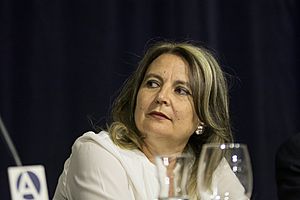Elvira Roca Barea facts for kids
María Elvira Roca Barea is a Spanish writer and expert. She was born in 1966. She studied philology, which is the study of language in historical sources. She focused on literature from the Middle Ages and early modern times. Her early work looked at how stories are told in different periods. She became well-known for her research on the Spanish Black Legend.
Contents
About Elvira Roca Barea
Elvira Roca Barea was born in El Borge, a town in Málaga, Spain, in 1966. She earned a degree in Spanish Philology. Later, she completed a master's degree in Medieval Literature. She also received a PhD in Classical Philology from the University of Málaga.
She has worked for the Spanish National Research Council (CSIC). This is a big research organization in Spain. She also gave lectures at Harvard University in the United States. Her scholarly writings are mainly about how ideas and stories are created through plays and books. She also works as a high school teacher in Alhaurín de la Torre.
Her Main Books
Imperiofobia y leyenda negra
Her book from 2016 is called "Imperiofobia y leyenda negra: Roma, Rusia, Estados Unidos y el Imperio español." This means "Empire-phobia and Black Legend: Rome, Russia, United States and the Spanish Empire." The book became very popular and won many awards.
In this book, Roca Barea talks about "Imperiofobia." This word combines "imperio" (empire) with "phobia" (fear or dislike). She uses it to describe how big, diverse empires are often unfairly criticized or made to look bad by other nations. She explains that this happens when people twist facts or make things seem worse than they are.
She argues that the Spanish Black Legend is not the only example of this. She says it's a very strong case of a problem that many empires have faced. She believes this also happened to ancient Rome and the Ottoman Empire. She also suggests it is happening to the modern United States in some parts of the world.
Her book defines what an "empire" is and what a "black legend" means. She then shows how different countries have used similar ways to criticize empires. She compares how people spoke against ancient Rome, Russia, the United States, and Spain. She also looks at how these empires reacted, or often, did not react. This book inspired a 2021 documentary film called España, la primera globalización, where Roca Barea also appeared.
Fracasología
Roca Barea's second book is called Fracasología. In this book, she expands on her ideas. She suggests that Spain's history has been shown in a twisted way. She believes this is partly because of how France and Protestant nations viewed Spain. She also argues that some Spanish thinkers have criticized their own country too much. She says this has led to a feeling of self-doubt among Spaniards.
Awards and Recognition
In 2018, Elvira Roca Barea received the Medal of Andalusia. This is an important award from the government of Andalusia, a region in Spain. She also received the Medal of Honor of San Telmo.
In 2019, her book "Imperiofobia y Leyenda Negra" won the Espasa-Calpe Award. This award is given each year for works of literature, journalism, and thought. The judges said her book was "a magnificent essay." They also said it was "a brave revision which changes the traditional image of the history of Spain." They felt it helped Spaniards understand themselves better.
See also
 In Spanish: Elvira Roca Barea para niños
In Spanish: Elvira Roca Barea para niños
 | Bessie Coleman |
 | Spann Watson |
 | Jill E. Brown |
 | Sherman W. White |


